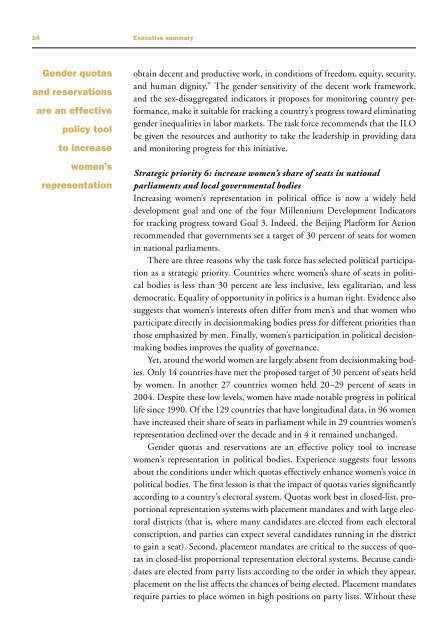Taking action: achieving gender equality and empowering women
Taking action: achieving gender equality and empowering women
Taking action: achieving gender equality and empowering women
You also want an ePaper? Increase the reach of your titles
YUMPU automatically turns print PDFs into web optimized ePapers that Google loves.
14 Executive summary<br />
Gender quotas<br />
<strong>and</strong> reservations<br />
are an effective<br />
policy tool<br />
to increase<br />
<strong>women</strong>’s<br />
representation<br />
obtain decent <strong>and</strong> productive work, in conditions of freedom, equity, security,<br />
<strong>and</strong> human dignity.” The <strong>gender</strong> sensitivity of the decent work framework,<br />
<strong>and</strong> the sex-disaggregated indicators it proposes for monitoring country performance,<br />
make it suitable for tracking a country’s progress toward eliminating<br />
<strong>gender</strong> inequalities in labor markets. The task force recommends that the ILO<br />
be given the resources <strong>and</strong> authority to take the leadership in providing data<br />
<strong>and</strong> monitoring progress for this initiative.<br />
Strategic priority 6: increase <strong>women</strong>’s share of seats in national<br />
parliaments <strong>and</strong> local governmental bodies<br />
Increasing <strong>women</strong>’s representation in political office is now a widely held<br />
development goal <strong>and</strong> one of the four Millennium Development Indicators<br />
for tracking progress toward Goal 3. Indeed, the Beijing Platform for Action<br />
recommended that governments set a target of 30 percent of seats for <strong>women</strong><br />
in national parliaments.<br />
There are three reasons why the task force has selected political participation<br />
as a strategic priority. Countries where <strong>women</strong>’s share of seats in political<br />
bodies is less than 30 percent are less inclusive, less egalitarian, <strong>and</strong> less<br />
democratic. Equality of opportunity in politics is a human right. Evidence also<br />
suggests that <strong>women</strong>’s interests often differ from men’s <strong>and</strong> that <strong>women</strong> who<br />
participate directly in decisionmaking bodies press for different priorities than<br />
those emphasized by men. Finally, <strong>women</strong>’s participation in political decisionmaking<br />
bodies improves the quality of governance.<br />
Yet, around the world <strong>women</strong> are largely absent from decisionmaking bodies.<br />
Only 14 countries have met the proposed target of 30 percent of seats held<br />
by <strong>women</strong>. In another 27 countries <strong>women</strong> held 20–29 percent of seats in<br />
2004. Despite these low levels, <strong>women</strong> have made notable progress in political<br />
life since 1990. Of the 129 countries that have longitudinal data, in 96 <strong>women</strong><br />
have increased their share of seats in parliament while in 29 countries <strong>women</strong>’s<br />
representation declined over the decade <strong>and</strong> in 4 it remained unchanged.<br />
Gender quotas <strong>and</strong> reservations are an effective policy tool to increase<br />
<strong>women</strong>’s representation in political bodies. Experience suggests four lessons<br />
about the conditions under which quotas effectively enhance <strong>women</strong>’s voice in<br />
political bodies. The first lesson is that the impact of quotas varies significantly<br />
according to a country’s electoral system. Quotas work best in closed-list, proportional<br />
representation systems with placement m<strong>and</strong>ates <strong>and</strong> with large electoral<br />
districts (that is, where many c<strong>and</strong>idates are elected from each electoral<br />
conscription, <strong>and</strong> parties can expect several c<strong>and</strong>idates running in the district<br />
to gain a seat). Second, placement m<strong>and</strong>ates are critical to the success of quotas<br />
in closed-list proportional representation electoral systems. Because c<strong>and</strong>idates<br />
are elected from party lists according to the order in which they appear,<br />
placement on the list affects the chances of being elected. Placement m<strong>and</strong>ates<br />
require parties to place <strong>women</strong> in high positions on party lists. Without these

















